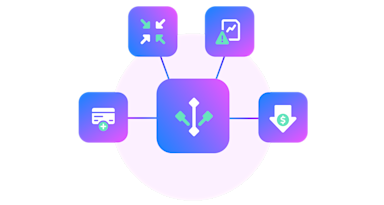Sensitive Data and Meeting Compliance Requirements
PCI DSS, GDPR, HIPAA, CCPA and Beyond - The Predicament of Overlapping Data Regulations
The DIY Approach to Data Security and Compliance
How to Outsource Data Security Compliance Entirely
These days, it seems that companies are having to navigate increasingly complex data compliance regulations. From following PCI DSS rules to maintaining HIPAA, GDPR, and CCPA compliance, the complicated web of global regulatory frameworks for data protection just keeps getting more and more tangled.
Depending on where your organization is based, and where its users reside, you may be subject to several data protection laws - some that often geographically overlap.
But with so many large-scale data breaches and highly-publicized sensitive data exposures in recent years, it’s understandable that governmental regulatory bodies are making sure businesses cover all their bases when it comes to data protection for personal information.
Keeping an eye on all of the general data protection regulations simultaneously, however, is no easy undertaking, and simple maintenance of compliance certifications is an increasingly expensive endeavor.
Trying to stay on top of all of them, at the same time, is nearly impossible for small-to-medium-sized enterprises.
This leads every business in the digital age to find themselves facing the same compliance conundrum: with the constantly changing landscape of global data security standards, how should my business design its data protection program?
Sensitive Data and Meeting Compliance Requirements
Personal data is flowing every which way.
Collecting, processing, and storing sensitive personal information - from SSNs to credit card data - is simply the name of the game nowadays. And risk management when it comes to information security has become more important than ever.
For any viable business to stay afloat in the digital age, they’re going to have to handle sensitive data in a secure fashion to avoid data breaches, non-compliance fees, and other potential pitfalls.
There are two unfortunate consequences that arise when a company gathers and stores sensitive personal information.
The first is the vulnerability that comes along with handling sensitive data as part of your business model. Possessing credit card numbers on your servers, for instance, leaves your company exposed to potential data breaches.
Even with advanced cybersecurity measures in place, some of the largest corporations on the planet - with incredibly well-funded data protection teams - have fallen victim to phishing attacks and large-scale data leaks.
Data breaches for a startup organization are relatively more dangerous and destructive than for larger corporations. Cybersecurity events like a data breach can and do end businesses overnight.

The total cost for the largest organizations (more than 25,000 employees) averaged $5.11 million, which is $204 per employee. Smaller organizations with between 500 and 1,000 employees had an average cost of $2.65 million, or $3,533 per employee. Thus, smaller organizations have higher costs relative to their size than larger organizations, which can hamper their ability to recover financially from the incident.
The second problem with having to manage sensitive data from your customers is that your business becomes within the scope of one or several data compliance standards. From the General Data Protection Regulation (GDPR) in Europe to the California Consumer Privacy Act (CCPA), the servers you store sensitive data on are now within the scope of compliance requirements.
PCI DSS, GDPR, HIPAA, CCPA and Beyond - The Predicament of Overlapping Data Regulations
Today’s data privacy compliance requirements are far from siloed.
The CCPA, for example, doesn’t apply to organizations with headquarters in California. Instead, all businesses that handle personal data belonging to California residents must comply with the rules.
Similarly, the GDPR necessitates that all companies managing personal data from residents of the EU comply with the data privacy requirements.
Then there are the Payment Card Industry Data Security Standards (PCI DSS), which credit card companies require companies to follow in order to be able to process credit card transactions.
The list goes on.
In many cases, businesses find themselves within the scope of multiple of these complex data protection frameworks.
Overlapping and intercontinental data privacy requirements are far from simple to deal with, and require an entire security team alongside a compliance team to even begin to manage if a company wants to achieve compliances on their own.
The DIY Approach to Data Security and Compliance
For those businesses that need to comply with more than one data privacy framework, their first thought may be to attempt a do-it-yourself (DIY) approach.
The DIY approach entails having your security team carefully map out a detailed data flow diagram to pinpoint all the locations where sensitive data is stored or flows, then performing a Self Assessment Questionnaire (SAQ), testing everything, and putting in place processes that ensure your business remains compliant moving forward.
Take that process, throw in a couple of extra data privacy laws, and suddenly you’re faced with a massive upfront investment and ongoing costs to make sure everything stays in order.
But what happens if you make an adjustment to your data privacy workflow? What about hardware or software update, upgrade or expansion?
You’d better get ready to prepare a new audit and re-test your infrastructure.
One single switch in the processes you develop can hurt your compliance status, and your team will have to scramble to get back on solid ground.
On top of all that, we haven’t even mentioned what could happen if regulations are updated or completely new data privacy compliance measures pop up out of nowhere - which can and has happened.
When your compliance status experiences even a small hiccup, it can cause a massive issue that sucks up substantial amounts of time, funding, and human capital to solve.
Thankfully, innovations in data security have enabled businesses to offload their data protection responsibility - and leave the mess described above to a third-party data security partner.
How to Outsource Data Security Compliance Entirely
VGS understands that it's overwhelming — you’ve only got so much time and so many resources available not only to stay up-to-date but also to make the required adjustments to your infrastructure and company policies.
Fortunately for you, VGS and our team of experts are here to keep your business compliant without any unnecessary downtime.
Our product suite offers quickly-implementable and simple software that allows you to handle sensitive consumer data without ever having to possess it on our own servers.
VGS enables you to remove your business systems from the scope of compliance regulations, and never have to worry about if compliance regulations are updated.
We are constantly working on educating ourselves to ensure that recently-introduced data protection regulations are covered, as well, so that your company can stick to doing business as usual.
We already have streamlined processes for CCPA, SOC2, and GDPR compliance.
Integrating with our systems also provides instant PCI Level 2 certification, with the option to fast-track PCI Level 1 compliance.
Regardless of the size of your organization or how established your data security system is in the current landscape, new compliance requirements and government standards are bound to arise, which may result in necessary software and hardware changes.
Instead of using your precious time and limited resources keeping up with new compliance requirements, or subjecting yourself to potential monetary consequences, let VGS handle it for you.
To learn more about how we can keep your business compliant-ready, send an email to contact@verygoodsecurity.com, or leave a message and one of our experts will contact you.




